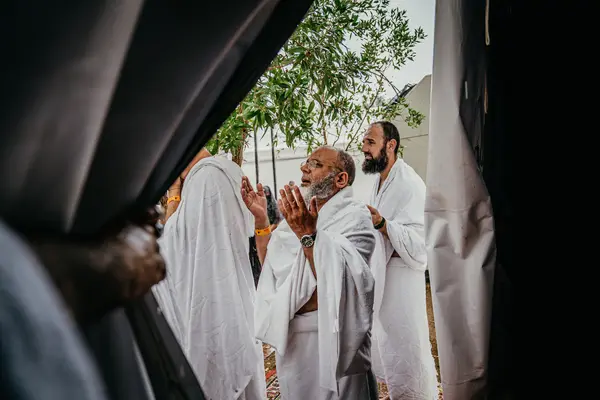
How to Pray During Travel: A Complete Guide Crédit d'image :
Publié le 6 février 2023, par Samir | 8 h 51 min
Temps de lecture : 4 minutes
Muslim travelers must plan their journeys smoothly, from getting halal food to praying in places that may have constrained space and different time zones. Depending on our own preparations, these things can make the experience smooth or challenging. Alhamdulillah, one of the virtues of Islam is that it offers substitutes for all our required obligations. Islam helps us overcome obstacles while keeping our well-being. In Surah Al-Baqarah, Allah says: يُرِيدُ اللَّهُ بِكُمُ الْيُسْرَ وَلَا يُرِيدُ بِكُمُ الْعُسْرَ « Allah intends for you ease and does not intend for you hardship. » [Surah Al-Baqarah, 2:185] NUMBER OF RAKATS WHILE TRAVELLING: It is absolutely permissible to lessen the fard rakats of Dhuhr, Asr, and Isha from four rakats to two rakats during the salah. It is acceptable to offer these daily prayers as two rakats when traveling. The Qur’an explicitly mentions the shortening of the prayer, and the Prophet Muhammad (PBUH) also affirmed it through the sunnah and hadith.
Allah says in Surah an-Nisa: »When you travel around the land, there is no blame on you if you shorten the Prayer, (especially) if you fear that the unbelievers might cause you harm. Surely the unbelievers are your open enemies. » [Surah An-Nisa, Ayat 101] The aforementioned verse might suggest that shortening the prayer is restricted to when there’s a threat or danger to life, but when Umar bin Al-Khattab asked Prophet (PBUH) about it that shortening prayer permissible even if it’s a safe journey, he replied: « This is a favor from Allah to you, so accept His favor. » Allah Almighty makes traveling convenient for His followers. Simplifying the prayer for safe travel is referred to as a Sadaka. The Sadaka of Allah should not be rejected. Combining Prayers – Jama and Qasar Every prayer must be offered at its specified time. Nevertheless, the prayers could be offered by combining them if there is a valid reason. One of these circumstances is when someone travels and has to pray simultaneously. Jama prayer is when two specific obligatory prayers are offered simultaneously, either during the first (taqdim) or second (ta’khir) prayer. While Maghrib can only be combined with Isyak prayer and vice versa, Zuhr can only be combined with Asar prayer. Hanafi scholars hold that only those performing the Hajj can combine two prayers. Other Islamic schools assert that combining the two daily prayers while traveling is permissible. This suggests that it is acceptable for the person traveling to combine the prayers of Dhuhr, Asr, Maghrib, and Isha. One should be mindful that only Dhuhr and Maghrib can be coupled with Asr and Isha. Qasar prayer is when one shortens the number of rakaat prayers, particularly from 4 rakaat to 2 rakaat prayers. However, there are a few conditions to be fulfilled in offering the jama or qasar prayers:
According to Syafi’i mazhab, the concession will last for five days. the day of arrival (1 day) and departure are included in the five days (1 day). Other views, eliminating arrival and departure days, permit extensions of more than three days. Praying on a moving vehicle There’s an option to stop at the Rest and Recreation (R&R) pit stops along the highways when traveling by car. We might not have the same privilege when on an airplane or train. Therefore, we’ll eventually have to offer our prayers while on the flight. Per the rules, we must conduct wudhu (ablution) before our prayer. We wouldn’t need to do the tayammum because water is available in flights and trains. Most importantly, please clean up the bathroom area after using it, and don’t waste water while ablution! We should do the five obligatory prayers by observing as closely as possible all of the movement integrals (arkan fi’li) of salat, including standing with our faces toward the direction of Ka’aba. The constrained space on a plane or train might make this challenging. For safety reasons, you may face the qiblah just during the « takbiratul ihram » and continue praying in any direction while sitting. One is supposed to face the most exact direction to perform their prayer if they fail to locate using technological ways. According to Imran Bin Husain (RA), the Prophet s.a.w. said: “Pray while standing, and if you can’t, pray while sitting, and if you can’t even do that, pray to lie on your side. » [Sahih Al-Bukhari] While some modern airplanes have a space to offer prayer, this is not the case for most accessible airlines. The Syafi’i madhab states that if one cannot offer prayer while facing the qiblah due to dire circumstances, it is necessary to offer the fardh (obligatory) prayer after reaching the destination to perform the full fardh prayer (qadha). |
mar. 8 Sha'bane
الثلاثاء 8 شعبان |
| Contact | Mentions légales | A propos | Ressources | Blog | Glossaire | Questions réponses sur l'islam |
| Devenir musulman - Islam et terrorisme - Se convertir à l'islam - Prénom musulman - Roqya |
| English : al hamdulillah | Arabic : الحمد الله al-hamdoulillah.com © 2026 |